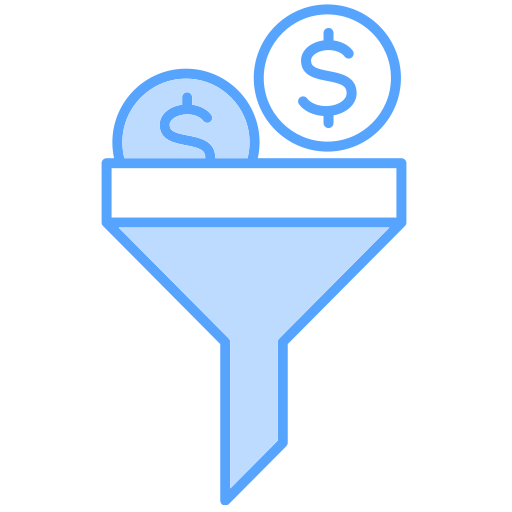A sales funnel, also known as a purchase funnel or marketing funnel, is a visual representation of the customer journey from the initial awareness stage to the final purchase stage.
It illustrates the step-by-step process that potential customers go through when considering and eventually making a purchase. The funnel analogy comes from the fact that the number of potential customers decreases as they move through each stage, similar to how a substance passes through a funnel and reduces in quantity.
The typical stages of a sales funnel are as follows:
- Awareness: At the top of the funnel, potential customers become aware of a product, service, or brand through various marketing channels such as advertisements, social media, content marketing, or word-of-mouth.
- Interest: In this stage, the potential customers, who have shown initial interest, actively seek more information about the product or service. They may visit the company’s website, read blog posts, watch videos, or engage with content that provides valuable insights.
- Consideration: In the consideration stage, prospects evaluate their options more closely. They compare the product or service with competitors, read reviews, and seek feedback from others.
- Intent: At this point, the potential customers have a clear intention to make a purchase. They may have added items to their shopping cart, requested a quote, or shown other indications of readiness to buy.
- Purchase: The purchase stage is where the prospect becomes a paying customer. They complete the transaction and acquire the product or service.
- Post-Purchase: After making the purchase, the customer enters the post-purchase stage. This stage focuses on customer satisfaction, support, and engagement to encourage customer loyalty and potential repeat purchases.
The goal of a sales funnel is to guide potential customers through each stage and convert them into paying customers. It helps businesses identify areas where prospects might drop off and allows them to implement strategies to improve conversion rates. Understanding the sales funnel can also aid in optimizing marketing efforts and tailoring content to specific stages of the customer journey.
In modern content marketing, sales funnels are often managed and tracked using various tools and analytics to measure the effectiveness of marketing campaigns and optimize the customer experience.
See also: Benefits of writing a technology whitepaper
- How to Build a GoHighLevel Funnel: A Step-by-Step Guide - February 13, 2025
- Designing a Healthy Online Presence: Medical Website Design and SEO - February 3, 2025
- Confluence vs. SharePoint: Which One is Right for You? - February 2, 2025
